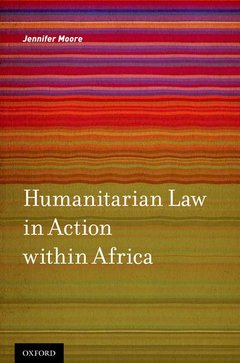Description
Humanitarian Law in Action within Africa
Author: Moore Jennifer
Language: English
Subject for Humanitarian Law in Action within Africa:
Publication date: 04-2012
384 p. · 16.1x24 cm · Hardback
384 p. · 16.1x24 cm · Hardback
Description
/li>Contents
/li>Biography
/li>
In Humanitarian Law in Action within Africa, Jennifer Moore studies the role and application of humanitarian law by focusing on African countries that are emerging from civil wars. Moore offers an overview of international law, including its essential vocabulary, and describes four particular subfields of international law: international humanitarian law, international human rights law, international criminal law, and international refugee law. After setting forth this overview, Moore considers practical mechanisms to implement international humanitarian law, focusing specifically on the experiences of Uganda, Sierra Leone, and Burundi. Through the case studies of these countries, Moore describes transitional justice's fundamental components: criminal, social, and historical. Although the African continent has gone through some of the world's greatest humanitarian emergencies, issues such as violence against women, child soldiers, and genocide are not unique to Africa, and as such, the study of humanitarian law by examining Africa's experience is important to conflict resolution and reconstruction throughout the world.
Introduction. Part I: International Legal Rules for Conflict Resolution. Chapter 1: The Human Fundamentals of International Law. Chapter 2: Humanitarian Law: the Law of Armed Conflict. Chapter 3: Human Rights Law: the Law of Human Dignity. Chapter 4: International Criminal Law: Accountability for Crimes of War and Crimes against Humanity. Chapter 5: International Refugee Law: Protection for Individuals Fleeing Persecution and Armed Conflict. Part II: Humanitarian Law and Post-Conflict Reconstruction in Africa. Chapter 6: Tools for Implementing Humanitarian Law: Courts, Troops, Media, Development and Communities. Chapter 7: Beyond Juba in Uganda: Reconciling Restorative and Retributive Justice. Chapter 8: After Lome in Sierra Leone: The Special Court and National Reconciliation. Chapter 9: Apres Arusha au Burundi: "Desarmer le Coeur pour Desarmer le Corps". Conclusion.
Jennifer Moore is a Regents Professor of Law at the University of New Mexico School of Law and was Director of UNM Peace Studies. She has worked for the U.N. High Commissioner for Refugees, first as an associate protection officer in West Africa, then as a legal officer in Washington, D.C. Professor Moore received her J.D. from Harvard and was a recipient of a Fulbright Scholarship.
© 2024 LAVOISIER S.A.S.




